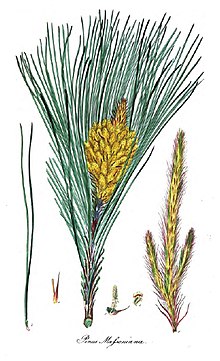Pinus massoniana
| Masson's pine | |
|---|---|

| |
| Scientific classification | |
| Kingdom: | |
| Division: | |
| Class: | |
| Order: | |
| Family: | |
| Genus: | |
| Subgenus: | |
| Species: | P. massoniana
|
| Binomial name | |
| Pinus massoniana | |
Pinus massoniana (English: Masson's pine, Chinese red pine, horsetail pine; Chinese: 马尾松) is a species of pine, native to Taiwan, and a wide area of central and southern China, including Hong Kong, and northern Vietnam, growing at low to moderate altitudes, mostly below 1,500 m but rarely up to 2,000 m altitude.[1]
Description
It is an evergreen tree reaching 25–45 m in height, with a broad, rounded crown of long branches. The bark is thick, greyish-brown, and scaly plated at the base of the trunk, and orange-red, thin, and flaking higher on the trunk. The leaves are needle-like, dark green, with two per fascicle, 12–20 cm long and 0.8–1 mm wide, the persistent fascicle sheath 1.5–2 cm long. The cones are ovoid, 4–7 cm long, chestnut-brown, opening when mature in late winter to 4–6 cm broad. The seeds are winged, 4–6 mm long with a 10–15 mm wing. Pollination is in mid spring, with the cones maturing 18–20 months after.[2][3][4]
Ecology
The Pinewood nematode from North America and pine-needle scale insect from Taiwan, have together virtually eliminated the native Pinus massoniana in Hong Kong in the 1970s and 80s.[5]
Uses
The species is a common trees in plantation forestry for replacing or compensating of the loss of the natural forest in southern China.[6] Chinese rosin is obtained mainly from the turpentine of this pine (Pinus massoniana) and slash pine (P. elliottii).
Logs are mainly used to make pulp for paper industry.
Leaves are used to give special smoke flavor to a local black tea, such as Lapsang souchong of Fujian province.
Culture
Notes
- ^ Mirov, N. T. (1967). The Genus Pinus. Ronald Press.
- ^ Farjon, A. (2005). Pines, ed. 2. Brill, Leiden. ISBN 90-04-13916-8.
- ^ Richardson, D. M. (1998). Ecology and Biogeography of Pinus. Cambridge. ISBN 0-521-55176-5.
- ^ Gymnosperm Database: Pinus massoniana
- ^ Porcupine! 23 - Hong Kong's Bad Biodviersity
- ^ Ecosystem services of various types of artificial forest in South China – a provisional summary
References
- Template:IUCN2006
- Pinus massoniana - Plants For A Future database report
- eFloras, Missouri Botanical Garden & Harvard University Herbaria (FOC Vol. 4 Page 14), Pinus massoniana, retrieved 2009
{{citation}}: Check date values in:|accessdate=and|date=(help)




